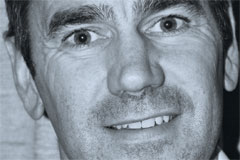The main focus of our work is trying to help people and I have discovered, over time, that the vast majority of our patients are nice, normal people. Now of course, if you take a cross section of society, there will be some people you get on less well with, that you don’t gel with, or simply dislike. As doctors, we have to see beyond that, and work around it, not allowing our mindset to affect the treatment we offer patients.
However, as a member of the public, slightly different rules might apply to us. There is no compunction to get on with people, or even try to like them, and this is never more relevant than at election time. I can let most things wash over me, but try telling that to the radio in my car after the morning journey to work listening to campaign guff. Shouting at the radio is more therapeutic than talking to the family – it doesn’t answer back.
I have a problem with elections. Firstly, whichever team I vote for always loses. Secondly, I don’t like politicians and therefore do not want to support them. Obviously if I had no social conscience then this would not be a concern as I could happily vote Tory knowing they have got me covered. I find it very hard to bond with politicians, particularly the ones in the public eye, and that is difficult to reconcile with my professional feelings. I try my hardest to see some good in everyone, or at least understand what has made things so difficult for them that their behaviour is challenging, but with politicians I just can’t do it. I don’t trust most of them, or believe them, but the trouble is we have to engage with the lying bastards.
Politics affects our daily work. There is an uncomfortable association between government, the NHS, NHS England and subsequently our CCG priorities, which in turn has a direct impact on patient care. So, whilst I want the very best for my patients, I do not wish to engage with politicians or anyone lower down their family tree. The dilemma, though, is can I provide adequate medical care without being actively involved in changing what is available for our patients?
I would guesstimate that about 95% of GPs are actually not interested in local politics or CCG shenanigans, they just want to do the job. This subject came up again at a recent partnership meeting as primary care community plans were presented to us whilst partners rolled their eyes and avidly updated their social media accounts. We are quite happy (within reason) to play ball and participate in all the cranky potential money saving ideas but at the end of the day there is NO MONEY and that is why we are all struggling. Having said that, how can it be our local trust will take nine months (if you are lucky) to provide a neurology appointment, but a neighbouring provider can do it in six weeks? More importantly, why the f*** am I even involved in pissing around trying to sort this out?
There is money out there of course – mostly being used to prop up the civil service during Brexit negotiations, or supplement border controls to keep out the health workers we desperately need. We, the NHS workers and patients, are sideshows. Collateral damage. Election fodder.
We have taken on a new role in our job – trying to access the least bad service for our patients. It might sound flippant, but it’s no joke. We now have to monitor secondary care as well, checking referrals and follow ups are carried out, holding hands with patients whilst they wait for the letters that never arrive. We do our best to ensure patients don’t fall through the widening gaps in the system. We’ve all seen things go wrong and there is no rescue on the way.
The good news? We won’t have to cram all that work in to just five days a week – we will be able to take our time over seven days in the future.
Be careful how you vote.
Dr Richard Cook is a GP partner in Hurstpierpoint, West Sussex. You can follow him on Twitter @drmoderate
Pulse July survey
Take our July 2025 survey to potentially win £1.000 worth of tokens





 Oviva’s fully remote Tier 3 Weight Management programme
Oviva’s fully remote Tier 3 Weight Management programme






